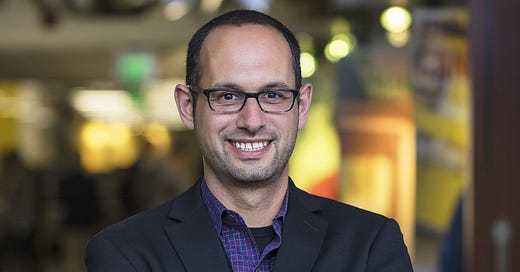Hello everyone
As promised, this week I have marketing and storytelling guru Jonah Sachs on the podcast. Sachs wrote “Winning the Story Wars” back in 2012, following up with “Unsafe Thinking” in 2018. Both are excellent books. I wanted to speak to Sachs in particular about what has been happening to Facebook in the story arena: I thought he would have an interesting take on how and why the social media giant was getting narratively beaten up.
As you’ll hear in the interview, Sachs is negative about Facebook and alarmed about humanity’s trajectory in general. Back in the 90s he started out with the then-common optimism about the impact of the internet. He thought that the fragmentation of narrative authority would be a good thing, and that democracy would be more representative in a world where everyone had a voice.
Along with the rest of us, he has seen that dream fade into the reality of incredibly powerful global platform companies (Google, Facebook, Amazon) and the consequences of media fragmentation and a loss of shared truth. Sachs stresses the importance of being able to agree on a set of facts.
“When we look at people who are storming the Capitol or believing Q Anon and all this stuff, we hear about the stories they're consuming, but we're not actually consuming the same media that they are. We have no source of shared truth, and therefore we can't even really contest these stories.”
One thing I note when I speak to and listen to Americans: their society is much more divided and partisan than Australia and New Zealand. It’s in worse shape. We live in a world where American preoccupations dominate the cultural milieu, and some of the best US thinkers are convinced the world is on fire. It’s easy to take on attitudes and obsessions from the dying empire. I think it’s worth keeping a bit of mental distance.
Nothing is more important than …
I was reading a book by 18th-century philosopher Johann Goethe the other day, looking for the actual wording of one of my favourite quotes (“Nothing is more important that this day”). Goethe was brilliant, very much a person of his time, and this book - which incidentally the internet served up to me free and at almost no effort - was a collection of his maxims. Page after page of declarations about the way things are. You can imagine relatives avoiding Uncle Johann at Christmas.
Couple of things that might be useful to you, and to the kind of anxiety that Sachs and many of us are experiencing. The first is that Goethe was convinced he was living in a mad time where things were changing with blinding rapidity. He was born 272 years ago.
“Who will be able to come up to the claims of an age so full and intense as this, and one too that moves so rapidly?”
Either Goethe was mistaken about his “intense age”, or he was right and the pace of change has been accelerating for 200-odd years. There is a third alternative I think more likely: change always appears to be accelerating regardless of circumstance. Can anyone back me up with a scholarly reference here?
The second discovery is relevant to our perplexity faced with the barrage of ill-informed beliefs and conspiracies apparent on social media.
“Superstition is a part of the essence of humanity. When we think we are getting rid of it altogether, it takes refuge in the strangest nooks.”
The revelation for me here was to understand online idiocy as superstition crawling out from a new nook. It may not bode well for the future if superstition is part of our essence, but it is comforting to know we have faced these demons before.
The really immediate future
For next week I am working on a podcast in a slightly different format - more of my narration, less interviewee - on the topic of management, and in particular managing newsrooms. Sounds dull, but don’t worry, you’ll be intrigued. I have also got the BBC’s Matthew Barraclough talking about his incredible local news and training program. The BBC is spending six million pounds a year and getting a lot of bang for its buck.
Bye for now,
Hal














